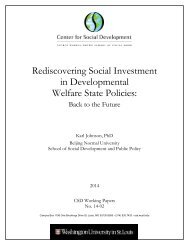Exploring and Assessing Intercultural Competence - Center for ...
Exploring and Assessing Intercultural Competence - Center for ...
Exploring and Assessing Intercultural Competence - Center for ...
You also want an ePaper? Increase the reach of your titles
YUMPU automatically turns print PDFs into web optimized ePapers that Google loves.
<strong>Exploring</strong> <strong>and</strong> <strong>Assessing</strong> <strong>Intercultural</strong> <strong>Competence</strong><br />
As an acknowledged leader in international, intercultural education, service, <strong>and</strong> development,<br />
The Experiment maintains both academic <strong>and</strong> project capabilities dedicated to promoting<br />
intercultural underst<strong>and</strong>ing, social justice, <strong>and</strong> world peace. Since its founding in 1932, its values<br />
have become ever more relevant in today’s world, <strong>and</strong> its programs have grown in scope <strong>and</strong><br />
intensity. Through distinctive methods based on experiential approaches to education <strong>and</strong> training<br />
<strong>and</strong> the integration of theory <strong>and</strong> practice, the Experiment Federation’s diverse programs are<br />
designed to provide life-changing experiences that develop intercultural competencies, create<br />
leaders, contribute to global development, <strong>and</strong> effect positive change.<br />
Summary<br />
The approach to developing world peace, one person at a time, follows Gh<strong>and</strong>i’s challenge when<br />
he said: “You must be the change that you wish to see in the world.” In other words, change<br />
occurs from the inside out. FEIL programs help this to occur in the context of providing quality<br />
intercultural programs, including some with a service component. All of these experiences<br />
include selection, orientation, language study, a homestay, <strong>and</strong> usually an additional component.<br />
In FEIL’s VIP Programs, this component involves participation in a service project. Most<br />
importantly, each individual intercultural sojourn is done in-country on that culture’s own terms.<br />
This means that participants learn in the way of the culture of the host society, requiring the<br />
development of an emic approach.<br />
The findings in this study rein<strong>for</strong>ce numerous anecdotal <strong>and</strong> statistical reports accumulated over<br />
three-quarters of a century. While learning about others, participants also learn about themselves.<br />
Because the nature of intercultural encounters is always provocative, it promotes deep<br />
introspection <strong>and</strong> reflection. Rarely does one return with more stereotypes or intolerant attitudes.<br />
And learning about others provides new vantage points <strong>for</strong> learning more about oneself. The<br />
returnee typically remarks: “I learned so much about Ecuador, but you know what? I learned even<br />
more about myself.” Looking out is looking in. Underst<strong>and</strong>ing <strong>and</strong> changes of perspective occur<br />
<strong>for</strong> most <strong>and</strong>, as a result, they return home deeply changed.<br />
The intercultural experience normally constitutes the most profound educational experience of<br />
their lives. And changed participants return to live their lives differently, affecting others in the<br />
process. And, in so doing, they are moving in the direction of the institutional vision <strong>and</strong> mission.<br />
This is what one sees consistently throughout all of the reports provided in this study.<br />
D. The Host Perspective<br />
As previously stated, mentors completed two types of survey <strong>for</strong>ms: 1) about their views of<br />
volunteer per<strong>for</strong>mance (Mentors/Volunteers or MV) <strong>and</strong> 2) about their own development<br />
(Mentors/Self, or MS). In the first case, of 5 supervising mentors, 4 completed questionnaire<br />
<strong>for</strong>ms at the beginning of the volunteers’ programs, 3 at the end, <strong>and</strong> 4 gave personal interviews<br />
(+I). This summary examines mentor views of volunteer per<strong>for</strong>mance.<br />
<strong>Center</strong> <strong>for</strong> Social Development<br />
Washington University in St. Louis<br />
49
















